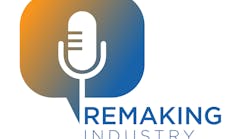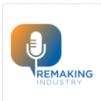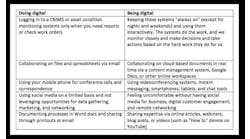Remaking Industry Podcast: What—really—makes a successful digitalization project?
Chris: Welcome to the Smart Industry podcast, "Remaking Industry," where we dive deep into the tools, techniques, and technologies that are accelerating digital transformation. All right. Thanks for joining us. My name is Chris McNamara, editor in chief with Smart Industry. Today. We are with Ricky Singh, who is VP of IoT, Americas with Software AG. Ricky, thanks for joining us on the "Remaking Industry" podcast.
Ricky: Chris, thanks so much for having me here.
Chris: Yeah. Before we get into the meat of the presentation here, let's get to know you a little bit. Tell me your favorite thing to order in a restaurant. What's your favorite meal?
Ricky: Oh man. This is a tough one given that I'm a foodie, but anything to do with a potato. I think it's probably the most versatile type of food there is, right? You can find it on almost every menu. It could be mashed, it could be fries. It could be, you know, sort of a special take on the cuisine. And I think it's one that I usually go to on an order.
Chris: Wow. I have not heard that answer from anybody. I grew up in an Irish household with an Irish cook for a mother and so my request would always be anything but a potato. Talk to me about the industry. What's your favorite thing about the industry? What draws you to this space?
Ricky: Just the versatility, I guess. Continuing my potato-type answer, it can be anything to everyone, right? IoT first of all, there's probably no more vague phrase, internet of things, right? It's like, okay, what is that actually? But really, I think it's the applicability of connecting the unconnected and envisioning new ways of doing both new and old things that really surface itself in such exciting ways, depending on, you know, the industry that our customers are in. So, it's new challenges. I am the type of person that does get bored easily and I think IoT is just, you know, a host of...a plethora of opportunities that I, as I walk around my city, or as I interact with other businesses, see tons of opportunities in applying this unique technology and capability.
Chris: Yeah. Very cool. Tell me briefly who and what is Software AG?
Ricky: Great question. So, Software AG is a 52-year-old company, was originally founded in Germany. And the AG part of it is actually, you know, think about it as the equivalent of Inc. or LLC that you see at the end of a lot of companies in the U.S. So, the fact that the name of the company is Software, which I think is super cool, right, but the types of software that I think our customers in the industry have needed over the course of that half a century has, of course, evolved and so has our company as a result of that. We sort of got our roots in database management systems, which was the sort of, you know, founded, if you may, of the sort of client-server infrastructure that we used to work in. And now more recently with the digital transformation happening in almost every industry, the company's done an amazing job in remaining relevant. And we're now focusing on integration, business process transformation, and IoT and analytics to help customers in some of their most pressing challenges today.
Chris: And you're new into the role of VP, correct?
Ricky: I am. I think this is my fourth week here so drinking from the proverbial water hose, if you may.
Chris: Yeah, right. What's your focus? What are you gonna do differently? What's your passion in that spot?
Ricky: So I'm in the role itself really responsible for our overall strategy and execution in the Americas market, essentially aligning the value of our IoT and analytics products and services with the customers that need that value, right? So, I kind of think about it as part evangelism, which, you know, sounds kind of obtuse, but it's really understanding what are the market-specific trends? What are our customers in either specific verticals or in the Americas market as a whole struggling with? Part of it is strategy, then how do we go to market and address the needs of those customers? Because as I mentioned earlier, IoT is everything to everyone, which sometimes means nothing to no one, so really being a little more purposeful in how we go to market. And then, you know, of course, part of it is sales.
Chris: Yeah. Well, you know, the role of the evangelists/educators is still so important. I mean, you know, as these trends mature, and they become more ubiquitous, a lot of us think that everybody's on board and everybody understands. And then when you get out in the real world, you really realize there's a lot of lack of understanding about how to even get started. And there's a lot of intimidation and a lot of trepidation about taking first steps with some of this stuff.
Ricky: Absolutely. I think it's, you know, while the possibilities are endless, that also makes it a little bit overwhelming as to how you get started and what are the goals that you wanna achieve.
Chris: For sure. In that vein about goals you want to achieve, let's talk, what makes success, I'll ask you very bluntly, what makes success with an IoT project? You know, as you said, the goals are wildly disparate, and the verticals are all over the place, and the size of industry is from tiny to global. But can you, kind of, describe in a general sense what a successful IoT project looks like?
Ricky: Absolutely. Let me maybe start by answering your question slightly differently if you don't mind.
Chris: Sure.
Ricky: I'll talk about what makes an unsuccessful IoT project, right? And that's connecting things for the sake of connecting them, simply because it's become cheaper and faster to do so, right? I think this is a recipe for disaster, just having more connected devices and data in isolation is not helpful and likely a reason why we see so many IoT projects die, and I'm using my air quotes here, "POC hell," right? Because we can, in most cases, prove the technology works, it's mature enough from a computing perspective, connectivity's come a long way, we're able to do a lot more things with data than we could before, but just connecting things in isolation, I think, is where a lot of our customers and who I see in the marketplace fail.
I believe a successful project, to contrast that, really starts with defining what success looks like for that particular company. What use cases they're prioritizing, the market context, what are the pressures they're dealing with. Start with the, what does success for us, meaning that particular company, look like in the long-term, and work backwards from that, taking bite-sized chunks in the IoT segment that prove out value in each phase? Right? So I know we use proofs of concepts. I have actually latched on to proof of value or realization of value as a concept for our customers, because that you can incrementally realize, right? You could say, okay, "In, you know, 60 days, I want to be able to connect data from these machines, which will increase my proficiency...or my efficiency in operation by X percent." And if you can realize that, then that makes both the business and the technology stakeholders much more likely to support the project going forward.
Chris: Yeah. It validates those early efforts and it warrants scaling. So, that leads right into our next question here. You know, what kind of KPIs are we talking about? And these are across the board as well, but what are some of the most common things that you're looking at? Is it uptime? Is it, you know, specifics about general...about optimized processes? Is it overall revenue generation, throughput? What are we talking about?
Ricky: Yep. All of the above. I think there are definitely core technology metrics that are similar to what we see in other categories. Things like platform, uptime, availability, scalability, I think those are all table stakes than anything sort of technology-related today. Right? And it's things that our IT buyers probably care more about. I believe in IoT, the more important KPIs are the ones that are business-related, right? And each customer again will have their own measure of what success looks like. If we're talking to a plant manager that's responsible for a factory floor, they're gonna care about overall equipment effectiveness. They're gonna care about how much that production line is turning out and what the downtime metrics are, right? If you're talking to a field service operator or a construction site manager, they're gonna care about, "Hey, how effective were my people?" Right? So people tracking is just as much a part of IoT as equipment tracking. So, I think the KPIs for industry are slightly different. In fleet management, it's going to be how many miles could I drive without interruption and my engines failing on my car. So I really like to start, and I think where the value in IoT is, is what is the impact to the business? And then thinking about the sort of table stakes, the IT KPIs as secondary to the business KPIs.
Chris: Yeah. Yeah. You know, we were just talking about personnel and workforce management and team management, things like that. One of the recurring messages that always comes up in discussions that we have about any component of this whole digital transformation stuff is the workforce, is the people that are working within and alongside these solutions. And it's critical. You know, while this technology is amazing and these approaches are cutting edge, it always comes back to the people that are working with them. Who is involved in an IoT campaign being successful or who is not involved, or is anybody not involved? Does optimal success entail the whole enterprise being on board with these approaches?
Risky: Yeah. I mean, the whole enterprise gets tricky because it might include, you know, people in HR, marketing, legal, etc. And I'm sure at some point they'll all touch what the company's looking to do in IoT projects. But the projects where I've seen the most success early on are the ones where there's close collaboration between IoT...sorry, between IT, the line of business, and the executive champion that's able to align those IoT efforts with the broader digital transformation efforts of the organization, right? They're the ones that see the big picture as to where the company's come from and where the company's going and can help sort of steer the sort of North Star, right, and make sure that the projects that the teams are working on are aligned. But then more often than not, as I mentioned earlier, you know, we've got a lot of people in IT that get, you know, research and development budget for a fiscal year and go and start experimenting in the IoT era.
And per my earlier comment, they're, you know, in a POC, able to show that they're connecting the unconnected and collecting data off of it. And then nothing happens after that because the person who's going to benefit from that IoT implementation is usually the line of business and they're not either involved or influenced early enough to be at the table with that decision, right? So, starting with understanding what is the, you know, end goal of the business. Is it process efficiency, is it new revenue streams? Aligning that with the overall sort of vision of digital transformation for the organization, and then bringing IT along for the ride. You don't wanna engage them too late either because they might say, "Hey, look, this is a non-starter. Some of the technology decisions you've made here just don't work in our environment." Right? So you don't want that either. Those are the most successful projects is where we have that tight articulation and partnership between an executive sponsor, IT, and the line of business.
Chris: Yeah. And, you know, we just touched on that a minute ago, where are we at with that? What does that level of understanding across the board about what really makes a successful IoT project or how to properly align the, you know, the nuts and bolts of a campaign with the larger business strategy? Is there a recognition of how that should align? Do you often see a disconnect among those teams? Is it getting better over time? Do people better understand that, you know, a project like this isn't the end solution, the end result should be, you know, working better in a larger sense and being able to achieve goals better, quicker, smarter, faster, cleaner. Where are we at with that level of understanding?
Ricky: I think it's...and Chris, you're familiar with this, the level of maturity for the types of organizations we talk to is drastically different. We've got companies that, you know, we call it IoT today, we used to call it telemetry before that, we've called it M2M over the course of time. I'm sure we'll find another fun acronym to assign to, moving forward.
Chris: Oh, sure.
Ricky: But I've always said the companies that had very tangible benefit from connecting the unconnected have been doing it for decades, right? We look at companies that manage intricate manufacturing processes, they know down to the millisecond how their machines are performing. So, they're gonna be much more adept at both identifying the types of outcomes they're looking for and the types of technology needed to deliver those outcomes.
And we have other customers that are just like, "Hey, you know, my competitive environment has just completely changed, right? I've got new entrants that are much faster, more nimble, more agile, that can embrace software and scalability much more than I can. And here I am still, you know, really good at creating this one product, but I don't understand. Let's take even, you know, monitoring the performance or capability of a product after I sold it." They're not used to that. So, I think just that level of maturity I've seen it at both ends of the spectrum, but it really goes back to my earlier comment, right, where if you can start by defining what success looks like with an IoT and analytics implementation, and then have the technology work towards getting you and, you know, getting off the ground and on the launch pad, as well as thinking about how you're gonna scale that implementation across potentially millions or tens of millions of endpoints really requires that collaboration between the business and technology partners inside of an organization.
Chris: That's where the evangelist comes in. Last question for you, Ricky, what most excites you about the near future of all this stuff? You know, in the next six months, or a year, or two years, what specific element of this stuff really piques your interest?
Ricky: I mean maybe it's the self-professed geek in me, but, you know, it's the endless opportunities across industries, sectors, and verticals that I see. And I think while, you know, more of these conversations, Chris, you probably appreciate this as you talk about...you know, talk on podcasts with many people, though we're talking about COVID less and less now, right, we spent all of 2020 talking about it, I really think it really did apply different pressures in different industries and created opportunities in various different aspects of our lives and in business that IoT can improve, right? You might, when you go into a shopping mall or a restaurant, see things like thermal temperature monitoring the equipment that ensures that we're being safe for not just this pandemic, but future ones that may arise. I think understanding when people are not going into offices, how do we leverage our office space? How do we collaborate and communicate with our customers? How does technology solve, you know, that challenge?
And when we have equipment out in the field that isn't being serviced as often by technicians, how can we connect those and manage, you know, experiences for our customers and their end customers? All of that I think has gotten a bright light shown on it in the last 12 to 18 months. And I think in the next 6 to 12 months, we finally, to use Gartner's reference in the Hype Cycle, we're past the hype of IoT, we're past the trial of disillusionment for IoT. I think we're now finally starting to see implementations of this technology and capability that is yielding great results for many of our customers. So that's the most exciting part.
Chris: Yeah. Excellent. Yeah. This has certainly accelerated the adoption of a lot of these concepts and tools and things like that. So, you hate to think of anything as a silver lining to this challenging period that we've been through, but it has certainly been interesting to see in this space about how this stuff has really accelerated and widened the adoption. Ricky Singh, with Software AG, thank you for joining us on the "Remaking Industry" podcast today.
Ricky: It was my pleasure to be here. Great conversation, Chris.
Chris: Yeah. It was nice talking to you, very sharp stuff. To our listeners, we appreciate you joining us here today. Please do check out this and all other podcasts in the platform there. And as always, we encourage everyone to go out and make it a smart day.



